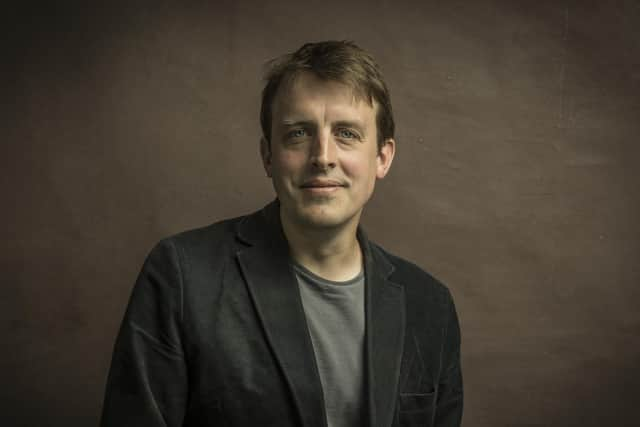Edinburgh International Book Festival round-up: Maddie Mortimer, Catherine Simpson & Tanya Shadrick | Val McDermid | Oliver Bullough
There’s a scene in the Booker longlisted debut novel Maps of Our Spectacular Bodies by Maddie Mortimer in which a primary school class is asked to draw what their parents do for a living. Iris, whose mother has breast cancer, draws a picture of a cancer cell with teeth and long hair. When it’s her turn to hold it up, the teacher stifles a laugh and tries to stop her. Later, she shows the drawing to her mother. “I’m glad you drew it with long hair,” she tells her. “I wasn’t going to draw a bald mum,” says Iris.
There’s a lot to unpack in that scene alone – the teacher’s embarrassment, the child’s directness, or the fact that the cancer cells are subsequently given a narrative voice of sorts – but there was a far more to come in the readings and discussion with fellow-authors Catherine Simpson and Tanya Shadrick that followed As their memoirs deal with the realities of facing up to breast cancer and an almost-fatal postpartum haemorrage respectively, this might sound like a dismal start to a drizzly Friday morning: three books so central to their authors’ psyches as to be dangerous to summarise, books which slip between fact and fiction, all in front of a small audience. It hardly sounds enticing, does it?
Advertisement
Hide AdActually, it was one of the best book festival events I’ve attended. Why? First, because Mortimer’s novel is so linguistically alive and challenging (and not remotely as sentimental as I might have suggested), but also because of the almost exasperated honesty of the two other writers. In Shadrick’s case, nearly dying made her realise how much she disliked the self she’d become: how small and unfilled her life had become in her 30s, no matter how fortunate it might seem from the outside.


To Simpson, a diagnosis of breast cancer brought terrors and loneliness that were only exacerbated by the ways in which the NHS seemed to avoid talking about it: everyone seemed to be in denial about the possibility of death, and the language they used reflected it. The more she thought about it, she realised, that’s the way it had always been with women’s health, but now she’d got to the point where she was sick of it; sick of the language of “toxic positivity”, sick of people not understanding, sick of the sheer weight of the literature about cancer – there are, apparently over 350,000 books or papers about it on the National Library of Scotland database – without a human dimension. You can never predict when a conversation between writers will catch fire, but this one emphatically did. I only wish more people could have seen it.
It’s far easier to catch up with what the king and queen of Scottish crime are up to, no matter how intent the Agatha Christie Estate lawyers are on stopping Val McDermid using that term in her publicity. On Thursday night, in conversation with Allan Little, she took us back to 1989, when her new Allie Burns novel is set. Back then, she was an unreviewed writer making a tax loss in her first two years. These days, with 17 million in sales and two TV series in production, that is almost impossible to imagine.
So, back then, was the future of Russia. As Oliver Bullough said, explaining to Ian Rankin how Britain washes Russia’s dirty money, he first went to St Petersburg around then because he thought that one day – maybe around now – the country would “become like an enormous Denmark”. Three weeks after he arrived, on the first day of the new century, Putin came to power. Sadly, that particular corner remains unturned.